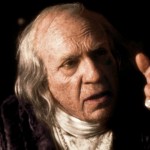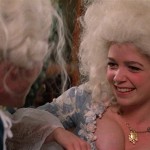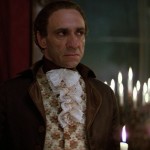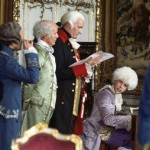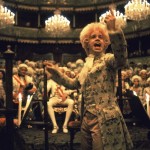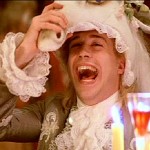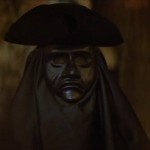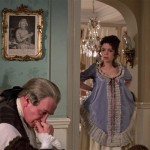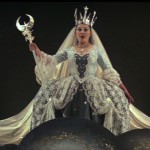
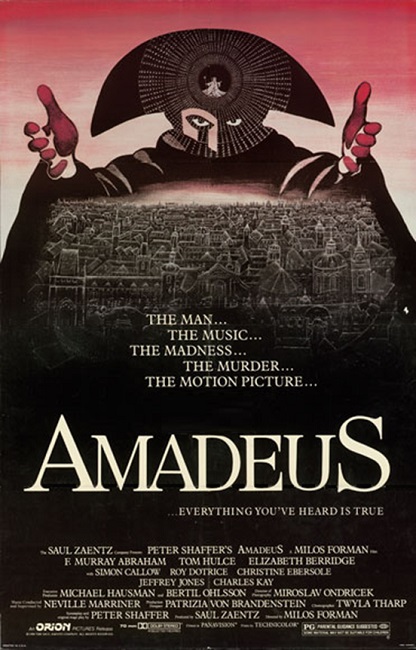
Amadeus – 1984
Right off the bat, I have to say that Amadeus was an incredible film. Director Milos Forman had a clear idea of what he wanted and the ability to make it work. He was able to get the perfect cast, permission to film in the right locations, which we’ll get to in a bit, a script that was beyond wonderful, and a realism that was incredibly believable, despite the almost fantasy-like nature of the film. This movie truly deserved all the awards it won.
Amadeus is based on the stage play, using the same name. It is a story told from the perspective of Antonio Salieri, masterfully played by F. Murray Abraham. His portrayal was nothing short of genius. The film begins with an extremely aged Salieri’s bloody attempt at suicide. He claims to have killed Mozart, a lofty claim, to be sure, since Mozart’s death is believed to be of an acute case of rheumatic fever.
However, Salieri, having been locked away in an insane asylum, recounts to a visiting priest his reasons for driving the genius composer to his death. The main body of the movie then begins, following Salieri during his tenure as Court Composer to Holy Roman Emperor Joseph II, played by Jeffrey Jones. Rumors of a child prodigy, now grown to manhood, named Wolfgang Amadeus Mozart, played by Tom Hulce, begin to circulate around the court. The Emperor asks to meet this young wunderkind.
But here is the catch. Salieri was so in love with music as a child that he prayed and made a deal with God. In this deal, he asked to be a composer of skill and notoriety. In return, he offered his chastity, his enterprise, and his very soul. And he remained true to his bargain. He was the figure of piety, abstaining from sins of the flesh, and devoting his professional life to the glory of music, which he thought of as God’s answer to his prayer.
But then Mozart arrives in Vienna and Salieri sees him being a debauched and perverted man, the adult version of a spoiled child. This incenses Salieri beyond sanity for one simple reason: because he has heard Mozart’s music and recognized the sheer genius of it. At first, he thought that the music’s unearthly beauty was a fluke. The little that he heard had to be a stroke of luck or an accident. But the more heard, the more he listened, the more he began to realize that it was anything but. And he began to think that God had cheated him. Through Mozart’s music, he heard the very voice of God Himself, so exquisite were the young reprobate’s compositions. He who had devoted his entire life to God and His glorification through his own music, which now seemed nothing more than mediocre when compared to that of Mozart, now felt like God was spitting on him and his paltry talents. That was when hate began to grow in his heart, hate for Mozart, and eventually, hate even for God.
Abraham’s performance was incredible, mesmerizing, intense, and utterly believable. Throughout the movie, the old Salieri, keeps returning to remind the audience that the story of Mozart is all a flashback in his mind as he confesses his professed crime of murder to the priest. These little scenes were so well written and so well acted. Abrahams won the Academy Award for Best Actor for his performance, and it was well deserved. He was phenomenal.
But I also have to give credit where credit is due. The screenplay was written by Peter Schaffer. The words he put into Salieri’s mouth were like poetry, powerful and profound. The way he described music and its beauty, the way it can touch and move the souls of men was truly inspired. But then, the way he described the depths of despair and hatred that the character of Salieri went through were also masterfully written.
Tom Hulce’s performance was also quite wonderful to watch. He was also nominated for the Best Actor Award. His portrayal of the tortured composer was wonderful. He played the petulant, spoiled boy with what seemed like ease. He played the great composer with real boldness and gravity. Of course, the real man, Mozart, was not nearly as flamboyant as he was depicted in the movie, but it was wonderful for the drama, played against the dire motives of the character of Salieri. But I believe that Abrahams won the Oscar over Hulce because Salieri was a much more complex character with infinitely deeper motivations.
Interesting note: Kenneth Branagh was actually one of the finalists to play the coveted role of Mozart, but he was dropped when Forman decided he wanted an all American cast.
Another interesting note: Tom Hulce had to learn to play the piano for the part, and would spend hours and hours practicing in his hotel room during filming so that it would look believable when he was shown at the keyboard. There is a scene in which Mozart has to play the keyboard backwards as he is held up-side-down over the harpsichord. It has been noted that he actually played all the correct keys visually to match the music being played in the film’s soundtrack.
Other notable actors in Amadeus were Jeffrey Jones, playing the Emperor, Elizabeth Berridge as Mozart’s devoted wife Constanze, Roy Dotrice as Leopold Mozart, Mozart’s father, and Simon Callow as Emanuel Schikaneder, Mozart’s friend who ran the local vaudeville playhouse. They all played their parts very well, especially, Jones and Berridge. Jones was always a delight to watch, he looked the part and played it very well. Berridge was a bit of a screen stealer for me. She was so common, not high born, and yet so earnest in her love for her husband. I really enjoyed watching her.
Interesting note: Meg Tilly was originally cast in the role of Constanze. Unfortunately for her, she was playing street soccer the night before filming was to take place. She tore a ligament in her leg that forced her to relinquish the part to Berridge.
Another interesting note: Simon Callow played the part of Mozart in the stage version, but was given the part of Schikaneder, the librettist of The Magic Flute, in the film.
Part of the film was shot on location in Prague, Kromeriz, and Vienna. Prague was a particularly difficult location since it is located in the Czech Republic. Half the crew and even some of the extras were made up of the Czech Secret Police. The main body of the movie was, however, shot in Vienna.
I would be remiss if I did not mention the costumes for this film. Every single person had to be fitted and dressed for the late 1700s. There were more wigs than one could count. There were costumes for peasants and royalty. There were theatre costumes for all the different operas depicted. They had to dress lords and ladies, adults and children. Theodore Pistek was the costume designer and though the task he took on was beyond belief, he really knew what he was doing. He earned his own Oscar for his work and he really deserved it. The costumes were simply fantastic! Well done Theodore!
I also have to think that making this movie had to be a particularly special experience for the actors and the crew involved for a very special reason. One of the authentic filming locations used in the film was the Burgtheatre in Vienna. This was the actual theatre in which The Marriage of Figaro, one of Mozart’s most popular operas had its actual premier. The theatre has had minimal renovations over the centuries and is in very much the same condition that it had been in 1786. But to perform scenes from the beautiful opera in the very theatre in which it premiered was apparently an emotional experience for the cast and crew.
As director, Forman went out of his way to ensure that this somewhat biographical film was, first and foremost, a drama. Some of the details were changed for dramatic effect, but I have no problem with that. Hollywood does that all the time. As long as the key points are maintained and no glaring untruths are told, then it makes sense that certain changes must be made when translating reality into a movie. That being said, here are a few of the historical inaccuracies that my research has uncovered. Time for a little history lesson.
Mozart and Constanze actually had 6 children, two of whom survived beyond infancy. The film only showed one child. The film also glossed over the fact that Mozart actually had a fairly respectable income and he and his wife enjoyed a plush lifestyle for a while. But times became difficult for him and all composers in Vienna at the time because of the Austro-Turkish War. Resources for his main patron, Emperor Joseph II, began to grow thin and paying a chamber composer became a secondary concern. The film never mentioned the war. Instead, it played into the drama of Salieri as he sabotaged Mozart’s career out of hatred and jealousy.
Also, the movie implied that Mozart’s last 3 operas were The Marriage of Figaro, Don Giovanni, and The Magic Flute. Cosi fan tutte, another of Mozart’s famous operas, was written in 1790. In addition, he wrote one of his lesser-known operas, La clemenza di Tito, which premiered in 1791.
And finally, it appears that the film was quite accurate in that Mozart had accumulated sizeable debts from borrowing. What it does not mention is that near the end of his life he actually started making a lot of money selling his music and subsequently started paying off some of his debts.
Back to the film. In a pretty minor part, Cynthia Nixon, famous today for her role on the TV show Sex in the City, played Lorl, Mozart’s maid. Actually her character was fairly pivotal. She was hired by Salieri to be Mozart’s maid so that she could be a spy, and even let Salieri into the apartment when the Mozarts were out. I just found it a surprise to see Nixon in the movie.
And finally, there was the music. Forman described the music of Mozart as an actual character in the film. The music was scored and conducted by Sir Neville Marriner, who agreed to take the job on one condition: that not a single note of Mozart’s music would be changed. Forman agreed and Mozart’s wonderful and beautiful music was used as the film score. The movie’s soundtrack actually reached # 56 on Billboard’s album charts, making it one of the most popular recordings of classical music ever produced.
Interesting note: In the beginning of the film, a snippet of the real Antonio Salieri’s music was used, though some of his notes were altered.
This was simply an incredible movie. The attention to certain details was wonderful and impressive to watch. But most impressive, to me was the music, the costumes, and Abraham’s phenomenal performance. And the drama was gripping enough to make me emotionally invested in the plot. It was a film that, even though I had seen it before, made me continue to think about it long after the final credits ended. This was truly a great and worthy addition to the list of Best Picture winners.
